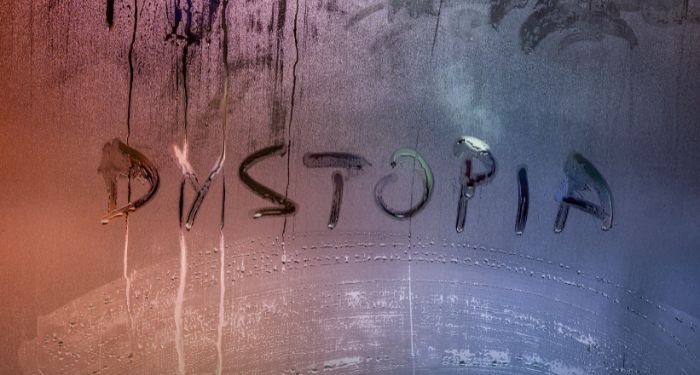I admit that dystopian comics are not generally my thing. I mean, we practically live in one: if I want to read about pandemics, the disastrous effects of climate change, increasing restrictions on human rights, and the seemingly unstoppable global rise of authoritarianism, I’ll go look at the news.
There are exceptions, of course. When I was offered an ARC of Knee Deep by Joe Flood, the eye-catching art and intriguing premise pulled me in right away.
It’s set in Cuba several hundred years from now, in a world where climate change has forced humanity to cope with food shortages, mutations, and worse. Everything, including the truth behind humanity’s collapse, is controlled by a mega-corporation, which sells its workers happy lies to cover up what really happened. When teenage Cricket starts to get close to the truth after her mentor’s horrifying death, she escapes underground and prepares herself to not just resist the corporation, but also to expose them — and find her long-missing parents in the bargain.
Since I enjoyed this story, my professed dislike for dystopian comics is clearly not a hard and fast rule. But where was the “line,” so to speak? Or was I wrong about disliking dystopia as a genre in the first place? Is “I don’t like this genre” just something I tell myself when, if I stopped to think about it a little more, I’d realize I do like it after all?
To get some perspective, I decided to ask a couple of my fellow Book Riot writers about why dystopian comics appeal to them. Here is what they said:
“I’m not usually a fan of science fiction and I have said this across the years without realising some of my favourite books and comics are actually dystopian, which falls under the SF umbrella. I guess dystopian tales are the exception that prove the rule.
“Strangely, I find dystopian novels comforting because they usually bring hope to hopeless scenarios. Be it a fascist state or an end of the world, the novels are usually focused on characters — on the people trying to survive and do good against something evil that is trying to destroy them.
“Of course, they are often a reflection of something already happening in the world, and it makes me believe that maybe there is a way out of the rut. That even in the worst of times we can find the best of people and make it through.
“Dystopian comics specifically manage to convey the environment pretty well, which I think offers dystopian novels an extra layer.”
~Carina Pereira
“I have an entire article about how much of the appeal of dystopian fiction is seeing a hero overcoming a fascist, authoritarian regime. And let’s face it, those types of regimes seem like they’re everywhere right now. Comics I’ve read like Akira, and Bitch Planet bring an extra layer with the artwork. The acute differences between the haves and have-nots are visually stunning. The desolation is stark. I’m not a visual artist, so I can never imagine things quite as well as a really good artist can depict it.”
~Chris M. Arnone
It wouldn’t be fair to draw broad conclusions from such a small sample size, but Chris and Carina agree that there is something special about a dystopian comic versus a prose story: the art. Dystopian stories often have such an intriguing (though disturbing) take on the world, and comics are uniquely suited to explore those settings.
They both also highlight the characters: the “have-nots” facing off against the “haves” to “survive and do good.” I guess that’s not something I really considered about dystopias: I was so focused on the miserable situations dystopias present that I never thought about the comfort provided by watching characters fight back against those situations.
In writing this article, I’ve noticed I can enjoy dystopian stories when they are aimed at kids. Knee Deep is a YA comic. Movies like WALL-E and Nausicaä of the Valley of the Wind are cartoons (and, in the latter case, a manga I have not read). So maybe I just need a gentler sort of dystopian tale, one that offers a more tangible ray of hope delivered through characters that are fun and lighthearted and likeable in addition to being resolute and brave.
That may not be as “realistic,” but with reality the way it is, who needs that, anyway?


